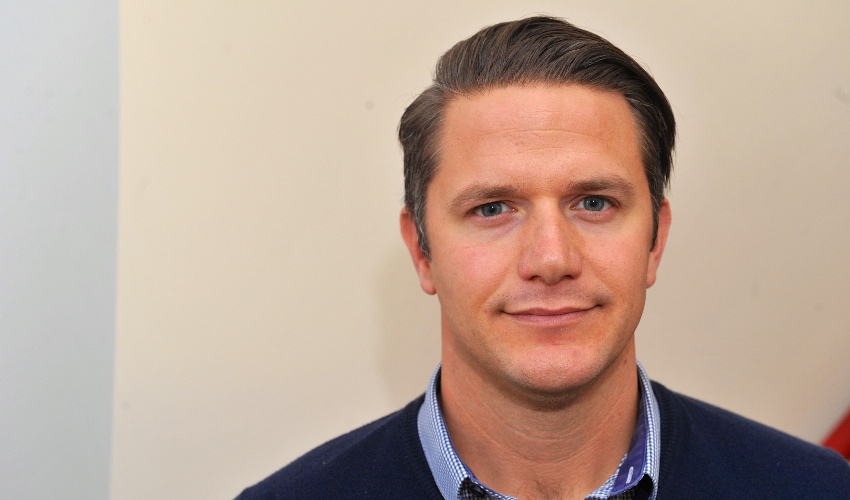


In case you hadn't noticed, the world’s most powerful nation goes to the polls today.
Although all House of Representatives' seats will be up for grabs and a third of the Senate, the most important election is between Vice-President Kamala Harris and former President Donald Trump to see who will call the White House their home for the next four years.
Express spoke to islanders with a strong connection to the United States to hear their views on the significance of today.
Pictured: Alan Goodson with his wife Niki and their children Ben and Charlotte.
Jerseyman Alan Goodson has lived in the United States for almost 20 years.
Writing to Express from Philadelphia on the eve of the election, Mr Goodson said: “Today is a beautiful cloudless Monday morning here; however, the calm is being increasingly broken by the thumping of Blackhawk helicopters passing overhead and the clanging of fencing being installed.
“It’s all in preparation for the arrival of Kamala Harris, who will hold the final rally of her campaign on the famous Rocky steps [outside the Philadelphia Museum of Art] tonight. It is a visceral reminder of what lies ahead tomorrow: US election day 2024.
“Despite having lived in the US for almost two decades, I only became a naturalised citizen in 2021. This means 2024 is my first presidential election as a member of the electorate and I switch roles from heavily vested bystander to an active participant.
“I also happen to live in Pennsylvania, a state that has many wonderful qualities, but rarely receives much national or global attention outside of US politics.
“It’s often said that ‘the road to the White House goes through Pennsylvania’. It’s because it is considered to be the largest prize of the so-called battleground states. These are the seven or so states whose electorate is very evenly split down major party lines and can swing from Republican to Democratic in any given election year.
“This is important due to the electoral college process by which US presidents are elected. Rather than simply totalling the number of votes for each candidate nationally, each of the 50 States are allocated a quota of electoral votes - it’s not precise but essentially electoral votes are allocated to each State based on population census data - of which there is a total of 538. The candidate that wins at least 270 electoral college votes wins the presidency.
“With 19 votes, Pennsylvania has the most electoral college votes among the battleground states and so most of the pathways to reaching the 270 votes required need Pennsylvania.
“So, lucky us! As you can imagine, election time in Pennsylvania is an overwhelming circus of political fanfare where a good portion of the billions of dollars raised in campaign funding is directed to every aspect of our lives.
“For many, many months, you haven’t been able to open your letterbox, pick up your phone, turn on the TV or even look outside your window without getting a visual tsunami of political signs, adverts, flyers and billboards. As I sit here writing this, I have already received three text messages reminding me to vote.
“Like anywhere, the party affiliations are not evenly spread across the state. As a general rule, the major urban populations of Philadelphia, Pittsburgh and Harrisburg are heavily Democratic, with the more rural communities more Republican.
“The blue Harris/Walz signs certainly dominate my neighbourhood just outside of Philadelphia, but I need only drive 30 minutes west and I will find myself in a sea of red Trump/Vance paraphernalia.
“This geographic patchwork also makes it very hard to tell from just looking around or talking to your neighbours which way the pendulum will swing. Sorry, but I can’t offer you any inside or local knowledge for where the chips may fall.
“What is all too apparent is that no matter which side of the political aisle you may sit, all the political attention and focus here creates a sense of heightened anxiety and anticipation as you approach election day.
“Somehow your vote feels disproportionately important. This would be true of any election, but in the last ten years, political discourse has evolved to a whole new level of ugliness. You then couple this with the 6 January insurrection, the economic aftermath of the global pandemic, two major wars, two assassination attempts and even the consumption of cats and dogs, we all feel like we’re in uncharted territory and the stakes have never been higher.
“Perhaps unfairly and no doubt less so now given recent political cycles, but I often felt in Jersey, the UK and in western Europe, democracy can be taken for granted.
“That’s not the case in America where we are reminded constantly that like a young seedling, democracy must be protected and nurtured or it will wither.
“No matter where you sit on the political spectrum, I hope that respecting and celebrating democracy is one thing we all agree on. In this spirit, I look forward to exercising my newly acquired constitutional right as a US Citizen when I mark my ballot tomorrow.”
Pictured: Lindsay Pitts shares her time between her native US and Jersey.
Lindsay Pitts shares her time between her native US and living in Jersey, where her partner is from.
Heralding from North Carolina, she lives in Austin, Texas – a city known for being ‘a blue dot in a red state’; in other words, a liberal urban stronghold surrounded by rural conservative turf.
She said: “I have lived in Texas for six years and Austin for two, and would describe myself as always liberal-leaning. It is a very diverse place, which is full of love and people taking care of each other.”
She added that it was important to remember that the vast majority of people in the US were decent people just getting on with their lives and the more extreme 'Make American Great Again' type were a distinct minority.
“In Austin, the vast majority of signs outside people’s homes are supporting Harris / Walz and it is only when you go into more rural areas that you see the occasional Trump sign,” she said.
“In these communities, there are a lot of people who feel disenfranchised and that they have missed out on the American dream.”
Living in a state next to Mexico, Ms Pitts recognises the issue of immigration, and agrees that the US has not done a good enough job in securing its border.
“However, it needs to be done in an humanitarian way, and certainly not through the solutions proposed by Trump, which includes mass deportations,” she added.
Ms Pitts did not vote in 2016 or 2020, but is urging all her friends to vote this time.
“It feels as though democracy itself is at stake with this election, and some very basic rights, including the issue of abortion, is on the line,” she said.

Pictured: Taylor Smythe lives in Jersey and works for a consultancy business promoting sustainability.
Taylor Smythe, who heralds from Virginia, now lives in Jersey and works for Hypha, a consultancy business promoting sustainability.
She said: “This election is particularly crucial, arriving at a time of intensifying and widespread global conflicts and pressing challenges, including climate change and a destabilised global economy.
“The stakes are high – not only for the US but also for the international community. If Donald Trump were to be re-elected, the potential for a shift in democratic norms and international relations would become a serious concern.
“Internationally, a Trump presidency could weaken alliances and embolden adversaries such as Russia and China, potentially leading to greater global instability, while he would almost certainly double down on supporting Israel without conditions, disregarding the need to prevent the loss of civilian lives.
“While it may be hyperbolic to claim that Trump’s re-election would signal a weakening of democracy, there are legitimate fears regarding the erosion of democratic principles.
“He has lowered the bar for respect towards others, normalising heinous behaviour and disrespectful, racist rhetoric. His dismissive behaviour is not consistent with leadership principles or any leader we would personally wish to work with or for.
“He has also shown a willingness to undermine democratic institutions, as seen during his first term. His approach to governance often mirrors that of leaders in countries where democracy has been compromised, raising alarms about potential authoritarian tendencies.”
Asked why the election was predicted to be such a close-run thing, she said: “The election is close due to a deeply divided electorate. There is palpable tension between those who seek to uphold democratic values and those who resonate with Trump’s populist message.
“The climate of political violence and Trump’s inflammatory rhetoric only adds to the uncertainty. I’ve spoken to many family and friends who are voting for Trump because they believe Kamala Harris represents the continuation of the same economic instability and social upheaval.
“Similarly to how people in the UK voted for Labour in a landslide, some voters are casting their ballots for change, not necessarily for the candidate himself. The major issues for them are the economy and immigration, which they feel would improve under Trump.
“I am genuinely concerned about the political divide, where even my own family members refuse to discuss any issue related to the election. Without open discourse and communication, we will not be able to resolve anything. We must reduce greenhouse gas emissions by 45% by 2030, and the next president will be in office until 2029.
“I am deeply concerned about the implications of all three branches of government being controlled by Republicans, and the risks this poses to the elimination of access to safe abortions, as well as hindering global cooperation on climate change.
“Regardless of the election outcome, I am reminded of Martin Luther King's teachings about the transformative power of love and the need to rise above our divisions and cycle of revenge.
“We often focus on our differences – but perhaps the more important question is not what we believe, but how we live out those beliefs. Do our beliefs prioritise love and unity, or do they lead to division and conflict?”

Pictured: Sean Dettman moved to Jersey in 2011.
Born and raised in Rockford, Illinois, Sean Dettman studied History and Literature at the University of Wisconsin before undertaking his postgraduate work at the School of Advanced Studies, University of London.
He moved to the island in 2011 with his Jersey wife Natasha, whom he met in London. Dr Dettman is a history teacher and Director of the Jersey International Centre of Advanced Studies.
He has recently completed a ‘History in the Pub’ series on the US election, where islanders can learn about and discuss issues and events over a pint.
Dr Dettman said that this election had a particular significance for America and the rest of the world.
He said: “It is significant for a number of reasons, in particular because we have one presidential candidate who is in full control of his party, who will probably not endure beyond this election cycle. That type of position is always significant; the Republican Party will be very different, regardless of what happens on Tuesday.
“Of course, there have been much more significant elections in the past, such as the first proper US election in 1800, which immediately split the country, and in 1860, when Abraham Lincoln won the national election and the Democratic party split between the north and south, which led to secession and ultimately the Civil War.
“This election, however, is particularly significant in what it means for social democracy and the post-war model of consensus politics. There doesn’t seem to be a distinct path towards social democracy in either of the parties’ language.
“And that is a strength to the Republican Party, in my mind, because it marks a political realignment for those who found comfort in that social democracy but no longer has a champion. In many ways, I think it is more a significant election for the Republican Party than it is for the Democratic Party.”
Asked who he thought would win, Dr Dettman said: “Whoever wins, Americans will get what they deserve.
“That will either be a Republican Party that is gripped by Donald Trump, and his visceral world view and approach to politics, or they will get a very vanilla defender of the status quo who does not have any strong positions on anything, and who will try to retain that slice of power and control for as long as they can.
“Do the Americans have enough choice? The answer is probably not but if that is the case, they only have themselves to blame.”
Comments
Comments on this story express the views of the commentator only, not Bailiwick Publishing. We are unable to guarantee the accuracy of any of those comments.